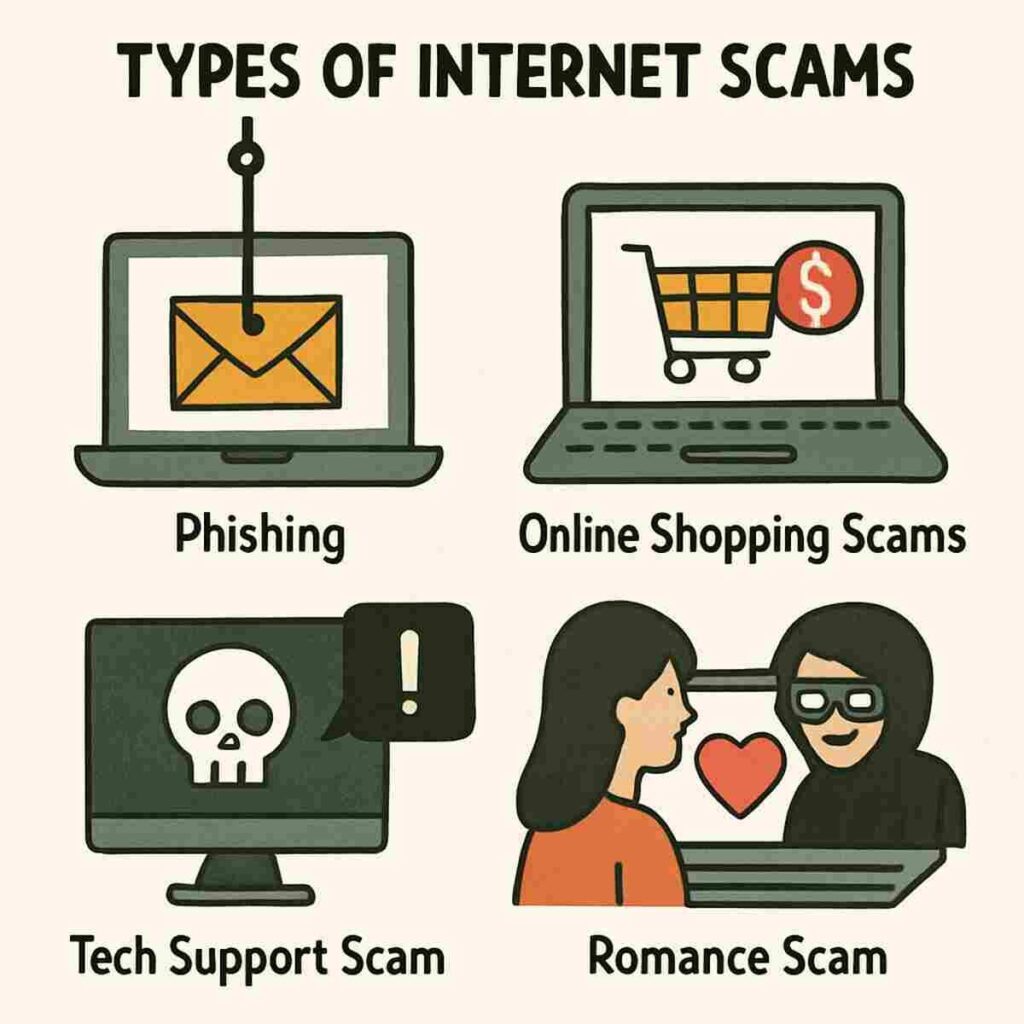How to Report Internet Scams Effectively
Hey there! If you’ve landed on this page, chances are you or someone you know has fallen victim to an internet scam. First off, let me say, you’re not alone, and there’s a way forward. In this guide, we’ll walk through how to report internet scams effectively and, fingers crossed, help you figure out how to get your money back from internet scams. Let’s dive in! An exceptionally fantastic fact about how to get money back from internet scams.
What is an Internet Scam?
Let’s start with the basics. An internet scam is a dishonest scheme that cheats people out of their money or personal information online. These scams can be super sneaky, taking the form of fake emails, dubious websites, or even social media messages from “friends” who are really scammers in disguise.
The Evolution of Internet Scams
Internet scams have evolved alongside technology. Back in the day, scams might have been simple spam emails, but now they can involve complex phishing schemes, fake apps, and elaborate social engineering tactics. The digital landscape has provided scammers with more sophisticated tools, allowing them to mimic legitimate businesses and services with alarming accuracy. This evolution makes it even more crucial for internet users to stay informed and vigilant.
Psychological Tactics Used by Scammers
Scammers often employ psychological tricks to ensnare their victims. They might exploit emotions like fear, urgency, or greed. For instance, a scam email might threaten legal action unless you respond immediately or promise a huge financial reward for a small upfront fee. Understanding these psychological tactics can help you recognize scams before it’s too late.
The Impact of Internet Scams
Beyond financial loss, internet scams can have significant emotional and psychological effects on victims. The shame and embarrassment of being scammed can deter people from reporting the incident or seeking help. Additionally, the breach of personal data can lead to ongoing identity theft issues, creating long-term stress and anxiety. Acknowledging these impacts is essential for victims to take proactive steps towards recovery and prevention.
Types of Internet Scams
There are so many types of internet scams, but here are a few you might recognize:
Phishing Scams
Phishing scams usually arrive as an email or message asking you to provide personal information. These messages often look legitimate, mimicking real companies or institutions. The goal is to trick you into clicking on a malicious link or providing sensitive information like passwords or credit card numbers. Staying cautious and verifying the source of any suspicious communication can protect you from these scams.
Online Shopping Scams
Fake websites or ads that steal your payment information are rampant in the world of online shopping. These scams often involve counterfeit goods, non-existent products, or items that never arrive. To avoid them, always research the seller and read reviews before making a purchase. Secure payment methods like credit cards can offer additional protection against fraudulent transactions.
Lottery and Prize Scams
Messages claiming you’ve won a prize and need to pay a fee to claim it are classic lottery scams. These scams prey on the excitement of winning, often requesting personal information or upfront payment. Remember, legitimate lotteries do not ask for fees to claim prizes. Always be skeptical of unexpected wins, especially if you haven’t entered any competitions.
Tech Support Scams
Fraudsters pretending to be tech support often call or message you, claiming there’s an issue with your computer. They may request remote access to fix the “problem,” only to install malware or steal your data. Genuine tech companies do not make unsolicited contact. Always verify the identity of anyone claiming to offer tech support, and never give remote access to unknown parties.

Steps to Take When You’ve Been Scammed
Alright, so you’ve spotted a scam or, unfortunately, fallen for one. Here’s what you need to do.
1. Stop All Communication
First things first, stop all communication with the scammer. If you’re corresponding via email, delete the emails. If it’s a phone call, block the number. This prevents further manipulation. Keeping a record of the scammer’s contact details can also be useful for reporting purposes. Remember, scammers often use fear tactics to keep you engaged, so cutting off communication is a crucial step in breaking their influence.
2. Gather Your Evidence
Next, gather all the evidence. This includes emails, receipts, screenshots, and anything that might help prove you’ve been scammed. This step is crucial when you report the scam. Organized evidence can strengthen your case and increase the chances of recovering lost funds. Additionally, sharing this evidence with authorities can aid in the prevention of future scams by helping them understand and track scammer tactics.
3. Report the Scam
Now, it’s time to report the scam to the relevant authorities. Here’s where you can start:
Reporting to Your Bank
If you’ve given out bank details or made a payment, contact your bank immediately to stop any further transactions and inquire about recovering lost money. Banks have protocols for dealing with fraud, and prompt reporting can lead to quicker action. They can also advise on additional security measures to protect your account from future threats.
Filing with Local Authorities
File a report with your local police. They might not always be able to help directly, but having a report can be useful for other proceedings. Police reports can serve as official documentation of the scam, which can be beneficial in legal or insurance claims. While local authorities may not always have jurisdiction over online scams, they can provide guidance and support.
Reaching Out to Consumer Protection Agencies
Report to agencies like the Federal Trade Commission (FTC) in the US, or the European Consumer Centre in the EU. These organizations collect data on scams and work to shut down fraudulent operations. They can also offer advice on steps you can take to protect yourself and your finances. Regularly checking their websites for updates on common scams can keep you informed and prepared.
4. Change Your Passwords
Scammers often aim to steal your login information, so change passwords for your email, bank, and any other critical accounts. Use unique and strong passwords for each account. Consider using a password manager to keep track of your passwords securely. Regularly updating your passwords and enabling two-factor authentication can provide an additional layer of security against unauthorized access.
How to Get Your Money Back from Internet Scams
Now, let’s talk about the nitty-gritty: how to recover lost money.
Contact Your Bank or Credit Card Company
The sooner you inform your bank or credit card company about the fraud, the better the chances of getting your money back. Many institutions have fraud protection services and can reverse unauthorized transactions. They may also monitor your account for further suspicious activity. Acting quickly not only increases the likelihood of recovery but also minimizes potential further losses.
Use Chargeback Services
If you paid via credit card, you might be eligible for a chargeback, which is a way to reverse a transaction through your card issuer. Contact your bank to initiate this process. Chargebacks can take time, so it’s important to provide all necessary documentation promptly. Understanding your card issuer’s policies on chargebacks can prepare you for the process and set realistic expectations.
Follow Up with Consumer Protection Agencies
Once you’ve reported the scam to a consumer protection agency, follow up regularly. They might not always provide a direct refund, but they can guide you on additional steps you might take. Persistence can sometimes lead to new opportunities for recovery or prevention. Keeping in touch with these agencies can also keep you updated on any progress in your case or similar cases that might impact your situation.
Preventing Future Scams
Prevention is better than cure, right? Here’s how you can stay one step ahead of scammers:
Educate Yourself
Stay informed about common scams and how they operate. Regularly reading updates from trusted sources can keep you aware of the latest scam tactics. Education empowers you to recognize red flags and make informed decisions. Sharing this knowledge with friends and family can also create a wider network of informed individuals, reducing the overall impact of scams.
Be Skeptical
If something seems too good to be true, it probably is. Double-check emails, offers, and websites. Skepticism is a healthy defense mechanism against scams. Trust your instincts, and when in doubt, seek a second opinion. Developing a habit of skepticism can prevent you from falling for too-good-to-be-true offers that are, in reality, traps.
Secure Your Devices
Use antivirus software and keep your systems updated to protect against malware. Regular software updates patch vulnerabilities that scammers might exploit. Investing in good cybersecurity tools can safeguard your personal information and prevent unauthorized access. Simple practices like not clicking on suspicious links and being cautious about downloads can significantly reduce the risk of infection.
Verify Before You Trust
Always verify the source of requests for money or personal information. Contact companies directly using contact information from their official websites. Verification is a crucial step in ensuring the legitimacy of any request. Developing a habit of verification can help you avoid scams and protect your personal and financial information.
Conclusion
Dealing with internet scams can be stressful, but knowing how to report and manage them is a powerful first step toward recovery. Remember, you’re not alone in this, and with quick action, you can minimize the damage and possibly recover your lost money. Stay safe online, and keep your eyes peeled for those pesky scammers!
Got questions or need more help? Drop a comment below, and let’s chat. Stay vigilant and scam-free!

